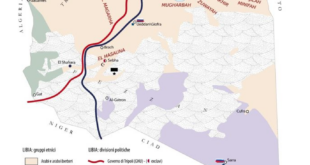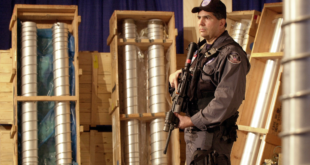 The Sudanese authorities say they have pinpointed the location at which 11 foreign tourists and their eight Egyptian guides are being held.
The Sudanese authorities say they have pinpointed the location at which 11 foreign tourists and their eight Egyptian guides are being held.
A Sudanese official said they were in a no-man’s land between the Sudanese, Libyan and Egyptian borders.
They were kidnapped in a remote area of south-west Egypt on Friday.
Efforts are continuing to negotiate their release. Egyptian officials say the German authorities are now leading negotiations with the kidnappers.
The hostages include five Germans, five Italians, and a Romanian tourist.
The Egyptian authorities say the kidnappers are gangsters who are demanding $15m in ransom money. They are not thought to have made any political demands as yet.
The undersecretary in Sudan’s foreign ministry Mutrif Siddiq said the hostages were in the Jebel Uweinat area and officials were co-ordinating with their Egyptian counterparts.
 |
“From our point of view the security of the hostages is the absolute priority – we do not want an operation that harms hostages,” he added.
Germany has not confirmed it is conducting any negotiations about a ransom, saying only it has formed a “crisis team” to deal with the matter.
Reports in the media quoting Egyptian officials say the hostage-takers have threatened to kill the captives if any attempt is made to reach them by aircraft.
An official speaking on condition of anonymity said the kidnapped tour operator contacted his wife by satellite phone and told her of the threat of execution and she passed it to the authorities.
Remote plateau
The Egyptian government says the hostages have been taken across the border into Sudan from the Gilf al-Kebir area where they were seized, which is close to Libya, Sudan and Chad.
Gilf al-Kebir is a giant plateau famous for its prehistoric cave paintings, which featured in the 1996 film The English Patient.
The tourism ministry said those abducted along with the foreigners were two guides, four drivers, a guard and the owner of the travel company.
Another group of foreigners was held at gunpoint in February and three of their vehicles were taken.
Egyptian Tourism Minister Zoheir Garana said the tour operator made contact with his wife on Friday via satellite phone and again on Monday. He said the hostages were “safe and well”.
“We are not involved in the negotiations over the ransom. It’s the German government that is responsible for whatever is related to the ransom,” Mr Garana told the Associated Press.
The Nile Valley and eastern Sahara have been considered mostly safe for tourists in recent years after a campaign of attacks by militant Islamists in the 1990s.
But a series of bombings have hit the newly-developed tourism centres in the Sinai peninsula, which are a major source of foreign currency for Egypt.
The authorities have blamed local Bedouin affiliated with militant Islamist groups.
The Gilf al-Kebir area is very sparsely populated and has virtually no police presence.
It is relatively close to chronic conflict areas such as Darfur in western Sudan and eastern Chad.
 Eurasia Press & News
Eurasia Press & News

